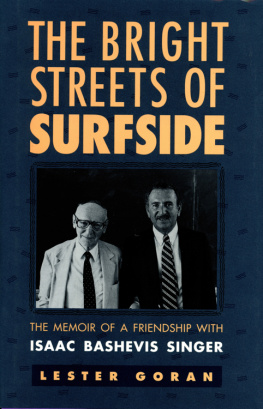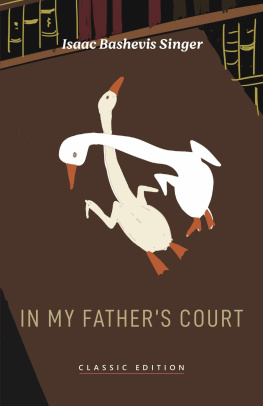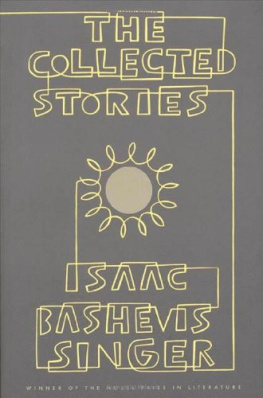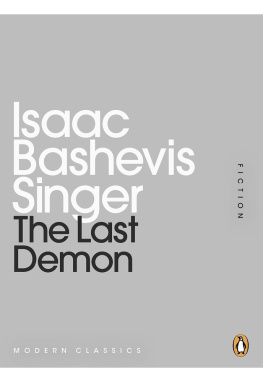Lester Goran - The Bright Streets of Surfside: The Memoir of a Friendship with Isaac Bashevis Singer
Here you can read online Lester Goran - The Bright Streets of Surfside: The Memoir of a Friendship with Isaac Bashevis Singer full text of the book (entire story) in english for free. Download pdf and epub, get meaning, cover and reviews about this ebook. year: 2011, publisher: The Kent State University Press, genre: Detective and thriller. Description of the work, (preface) as well as reviews are available. Best literature library LitArk.com created for fans of good reading and offers a wide selection of genres:
Romance novel
Science fiction
Adventure
Detective
Science
History
Home and family
Prose
Art
Politics
Computer
Non-fiction
Religion
Business
Children
Humor
Choose a favorite category and find really read worthwhile books. Enjoy immersion in the world of imagination, feel the emotions of the characters or learn something new for yourself, make an fascinating discovery.
- Book:The Bright Streets of Surfside: The Memoir of a Friendship with Isaac Bashevis Singer
- Author:
- Publisher:The Kent State University Press
- Genre:
- Year:2011
- Rating:5 / 5
- Favourites:Add to favourites
- Your mark:
The Bright Streets of Surfside: The Memoir of a Friendship with Isaac Bashevis Singer: summary, description and annotation
We offer to read an annotation, description, summary or preface (depends on what the author of the book "The Bright Streets of Surfside: The Memoir of a Friendship with Isaac Bashevis Singer" wrote himself). If you haven't found the necessary information about the book — write in the comments, we will try to find it.
The Bright Streets of Surfside chronicles 10 years in the life of Isaac Bashevis Singer, as witnessed and shared by a fellow writer close to him at the time. In 1978, with a mixture of hero worship and academic responsibility as director of creative writing at the University of Miami, Lester Goran brought Singer to teach at the Coral Gables campus. The eminent Polish-American author was then 74 years old and five months away from receiving the Nobel Prize. Goran became Singers closest friend and translator as they taught advanced courses in creative writing together until Singer retired in 1988. With a sometimes painful authenticity, Goran recounts the course of their extraordinary friendship. It was a fascinating time, writes Goran, recalling his frustration at Singers intractable desire not to teach (he mistrusted the faculty and was bewildered by the students) and his pleasure in Singers company. Touching and humorous, the memoir offers a rare opportunity to learn about this influential Yiddish writer who often concealed his real beliefs, feelings, and personal history from the public. Goran tells the tale with an honesty that is unsparing of his own dilemmas while it is deeply sympathetic to a great writer at odds with himself and his time. Looking frankly at a crucial time in his own life as a writer, Goran derives some understanding of the moral dimensions of Singers art as he was menaced by the burdens of loss, age, and fame. Goran discusses Singers philosophies about his life and art, his works in progress, and his lifelong devotion to literature. In addition, he offers his own reflections on working with the last grand Yiddish novelist and on his role in keeping Yiddish alive.
Lester Goran: author's other books
Who wrote The Bright Streets of Surfside: The Memoir of a Friendship with Isaac Bashevis Singer? Find out the surname, the name of the author of the book and a list of all author's works by series.










 Streets
Streets For Deedee
For Deedee Contents
Contents